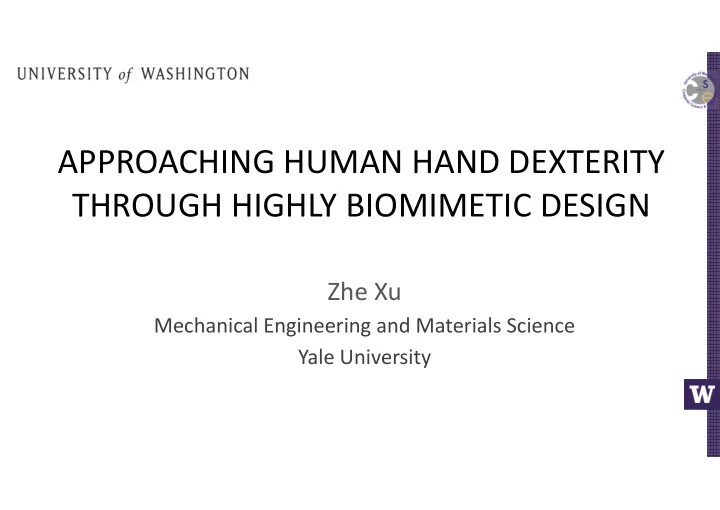

APPROACHING HUMAN HAND DEXTERITY THROUGH HIGHLY BIOMIMETIC DESIGN Zhe Xu Mechanical Engineering and Materials Science Yale University
Magician's Hand Manipulation Tricks Magician Peter Pitchford http://www.magicbymanipulation.com/ Introduction
Why Anthropomorphic Robotic Hands? By choosing five-fingered robotic hand design, researchers want to easily transfer knowledge of dexterous hand movements from human to robot ��������� �������� ���� !"������� %&'������� /�&0� ����� ,�&������� (��)������ ���������� ������������ ���#$� ������ ������ ������ ����-� ����-� ������ ������ ������ ��������� &)�&3�� �*.������� ����&������� ��'������� �1������ ������ ��������� �*������"+� ������ *�*&��&2 ����� ����$� ������ ������ ������ ������ ������ ������ Introduction
Using Brain to Control Anthropomorphic Robotic Hands Cortical homunculus shows how human brain sees the body from the inside Motor homunculus Sensory homunculus Introduction (Principles of Neural Science, 4th_Edition)
Autonomous Control of Anthropomorphic Robotic Hands Movement Control Lab, University of Washington (Mordatch et al., 2014) Introduction �
Tele-manipulation: A Practical Way to Extract Hand Dexterity from Brain √ ��4������������� 3�55&�4 Avatar, 2009 Introduction
The Anatomically Corrected Test-Bed (ACT) Hand Mimics: � Bone structure � Tendon routings � Joint DOFs � Muscles � 6 motors the fingers � 8 motors for thumb � 4 motors for wrist Introduction
Thumb Flexion Motion of The ACT Hand Introduction
Important Biomechanical Features Need to Be Mimicked http://www.wisegeek.org/ Introduction
The Conventional Mechanical Joint Used inside The ACT Hand Typical mechanizing process Introduction
The Common Mechanical Analogy of The CMC Joint ����'&�0��3���2��5�7������ �������5�6&�3�������2�3� �'�77����� Introduction
The Common Mechanical Analogy of The CMC Joint Introduction
The Shapes Of The Bones Decide The Basic Kinematics of The Human Hand Trapezium bone of the human thumb Unfixed joint axes(Crisco et al., 2015) Introduction
Our Approach Our highly biomimetic design truthfully matches kinematics of the human hand (Xu and Todorov, 2016) Introduction
Outline "������2�&�� � "35������������*&�3�2���&20 � ��0&4��8�9������5� � � 9��05�2�&:�����*�������"35�2�0�8�;������1��<
Human Hand Anatomy Blood Skin Bones Ligaments Tendon and muscles vessel & nerves "35������������*&�3�2���&20
Bones � Contains 27 bones with 8 small wrist bones � Four fingers and one thumb � The scaffold for the soft tissues � Trapezium bone is crucial for thumb opposition "35������������*&�3�2���&20
Articular Surfaces Decides Basic Kinematics and Distributes Stress Better Amy L. Ladd (2010) Halilaj et al. (2013) "35������������*&�3�2���&20
Joint ligaments � The collateral joint ligaments – prevent abnormal sideways bending � The volar plate -- prevents hyperextension � Stabilize the finger joints by forming the joint capsule � The joint capsule shapes the ROM of the finger "35������������*&�3�2���&20
Biological Joint Requires Less Parts Human thumb Thumb of the ACT Hand (Cam-follower CMC joint (Linkage CMC Joint with 3 parts) with 2 parts) ��������������������������������������������������������������� "35������������*&�3�2���&20 �������������������������������������������������������� !�� �"�
Human Hand Anatomy Blood Skin Bones Ligaments Tendon and muscles vessel & nerves "35������������*&�3�2���&20
The Extensor & Flexor Tendons -- The Transmission System � The transmission system of human hand � Finger straightens – pull the extensor tendons � Finger bends – pull the flexor tendons � Contain built-in mechanical advantages. "35������������*&�3�2���&20
The Gliding Mechanism of The Extensor Hood � A thin web-structure � Capable of changing shapes during different finger movements � Smartly regulating joint torques during finger extension and flexion motions. "35������������*&�3�2���&20
The Bulging Process of The Tendon Sheaths "35������������*&�3�2���&20
Summary of The Important Hand Biomechanics � Bones � Biological -- Demines the basic kinematics of finger movements finger joint � Joint ligaments -- Contributing to built-in compliance and shapes the ROM of each finger joint � Gliding mechanism of the extensor hood � Biomechanical -- regulating both extension and flexion transmission torques at finger joints � Bulging Tendon Sheaths -- regulating flexion torques at finger joints "35������������*&�3�2���&20
Outline "������2�&�� � "35������������*&�3�2���&20 � ��0&4��8�9������5� � � 9��05�2�&:�����*�������"35�2�0�8�;������1��<
Design & Prototype ���&'&2&�7�=�&�� � *&�3&3��&2�����03&00&�� � � 1��7�������&���4���&��
Design And Prototyping Process of the Artificial Joint (Xu et. Al,, 2011) ���&'&2&�7�;&�4�����&��
System Identification of The Artificial MCP Joint ���&'&2&�7�;&�4�����&��
Modeling of The Artificial MCP Joint ���&'&2&�7�;&�4�����&��
Design of The Biomimetic Index Finger (Xu et. Al,, 2012) ���&'&2&�7�;&�4�����&��
Design & Prototype � ���&'&2&�7�=�&�� *&�3&3��&2�����03&00&�� � � 1��7�������&���4���&��
Crocheted Extensor Mechanism � Compliant textile � Withstand high tensile forces � Can be made into any shape Henderson and Taimina, (2001) *&�3&3��&2� ����03&00&��
Testing The Mechanical Properties of The Crocheted Extensor Mechanism 1 2 3 (Xu et. Al,, 2016) *&�3&3��&2� ����03&00&��
Results of The Tensile Test • �#�$����������������������%����� �&������� (Xu et. Al,, 2016) *&�3&3��&2� ����03&00&��
The Crocheted Extensor Hood On The ACT Hand *&�3&3��&2� ����03&00&��
Improved Design of The Extensor Hood & Tendon Sheaths *&�3&3��&2� ����03&00&��
Design & Prototype � ���&'&2&�7�=�&�� *&�3&3��&2�����03&00&�� � � 1��7�������&���4���&��
Whole Hand Integration – Actuators (Xu and Todorov, 2015)
Whole Hand Integration – Data Glove
Evaluation
Evaluation
Outline "������2�&�� � "35������������*&�3�2���&20 � ��0&4��8�9������5� � � 9��05�2�&:�����*�������"35�2�0�8�;������1��<
Hand Dexterity Is A Personal Property “Regardless of the degree of training, not all musicians are cable of the same finger movements” (Watson, 2006) H.-M. Schmidt and U. Lanz, Surgical anatomy of the hand. Thieme. Stuttgart, 2004.
Recommend
More recommend